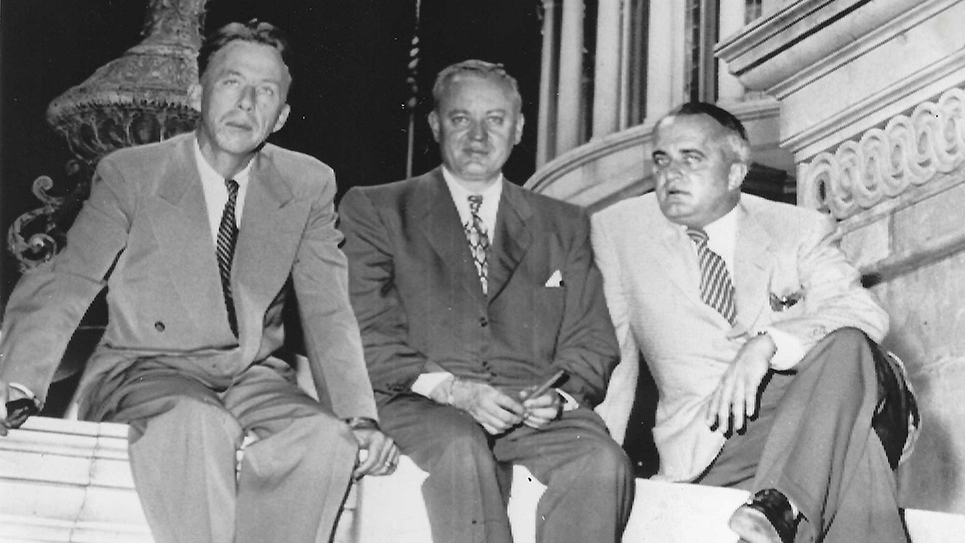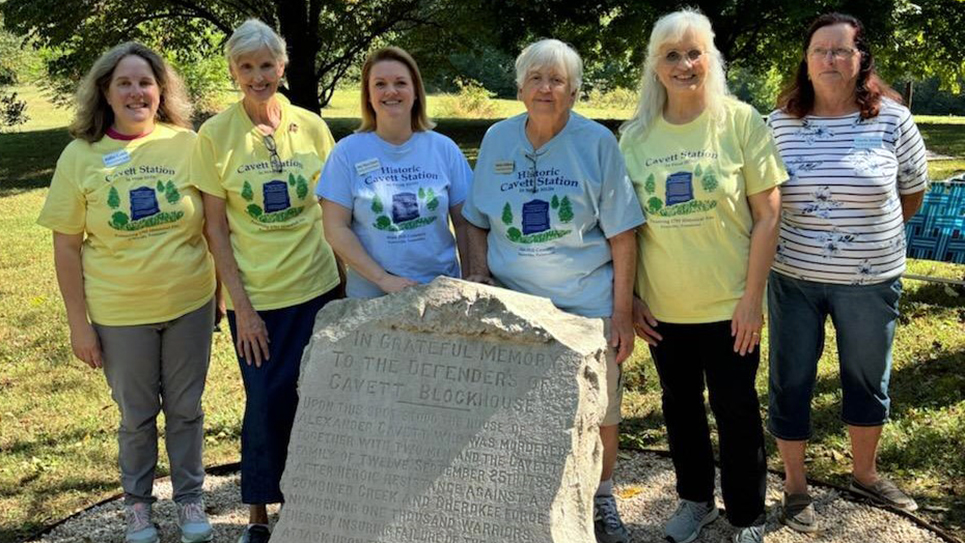
Photo from the author’s personal collection.
Congressman Thetus W. Sims of Tennessee is standing third from the left looking rather
forbidding. This photograph was taken in 1917.
For twenty-four years, Thetus W. Sims served West Tennessee as a member of Congress. Now almost entirely forgotten, he is a figure from a distant past. In fact, before his career was over, Sims was already becoming an antiquated figure, which helped to usher him out of office.
Sims had been superintendent of schools for Perry County briefly, but spent the majority of his pre-Congressional career practicing law. In 1896, he won the Democratic nomination to face Republican incumbent John E. McCall for Congress. Sims won the election and was reelected to another ten terms.
Perhaps the most infamous thing to occur during his political career, Congressman Sims had denounced Charles C. Glover, president of the Riggs National Bank in Washington, D. C., in the course of remarks on the floor of the House. Sims was hardly the first congressman to offend someone while speaking in Congress, but the Tennessean had encountered Glover in a public park while walking from his Washington home to the post office department, where he had business to conduct on behalf of constituents.
Sims later recounted that he had reached Farragut Square when he heard someone come up behind him, then felt someone touch his shoulder.
Thetus Sims was highly surprised to see Charles Glover glaring at him.
Glover said, “You owe me an apology for what you said about me on the floor of the House.”
“I am willing to apologize to any man whom I may have wronged,” Sims quoted himself as saying. “I do not think that I have wronged you because I think the facts warranted all that I said.”
That answer did not please Mr. Glover at all, who then promptly slapped Sims across the face. The startled Congressman’s hat flew off his head and Sims bent over to pick it up when Glover attacked him again.
Depending upon the version of the story told, Sims vaguely said he tried to return the blow, but Glover apparently got the better of the physical encounter. The bank president was chastised by the House for assaulting a member. Sims’s injured pride and dignity demanded an apology, which the House of Representatives eventually wrung out of the bank president.
In 1916, Sims took some pleasure when two young women from Tennessee were selected by C. W. DeLyon Nicholls, a social arbiter from New York, as the most beautiful girls dancing at a charity event that winter. One of the young women was Marie Sims, the Congressman’s daughter. The other was the daughter of Mrs. John Knight Shields, wife of Tennessee’s junior U.S. senator.
Congressman Sims left his hospital bed to cast his vote for suffrage for women and credited his daughter, Marie, as much of his inspiration. Marie Sims intended to go to France and work for the Red Cross during World War I, which likely caused her parents some concern.
Not every member of the Tennessee delegation was anxious to see women given the right to vote. Cordell Hull and Senator John Knight Shields were very much opposed to the idea, as was Congressman Finis Garrett, who represented the neighboring district to Sims’s own district. Chattanooga Congressman John A. Moon, who had come to Congress at the same time as Sims, was also opposed to federal legislation giving women the right to vote.
By 1915, Thetus W. Sims had been in Congress for eighteen years. He had been pondering running against incumbent Senator Luke Lea in the primary later that year. Former governor Malcolm R. Patterson was considering the race and Congressman Kenneth D. McKellar of Memphis had already announced his candidacy. Sims was fifty-nine years old at the time and likely resented McKellar’s entry into the race. From his own perspective, Sims was a long-time member of Congress, while McKellar had only been in the House of Representatives some four years. Thetus W. Sims was never really taken with K. D. McKellar.
On July 27, 1915, Sims took the plunge and declared himself a candidate for the Democratic nomination for the United States Senate. Sims, in Washington, released a statement blistering Lea, accusing the senator of “bossism,” denouncing his absenteeism as a member of the Senate, and decried Lea for having been “politically inconsistent”. Sims also charged that Lea’s votes on presidential appointments were determined by his own prejudices and personal likes and dislikes, something Congressman Sims evidently considered bad public policy.
Lea dismissed Sims’s opposition as political sour grapes. Sims had been enraged when Senator Lea had vetoed the appointment of a postmastership for one of the congressman’s friends.
Sims quickly determined he couldn’t raise the necessary financial or personal support to win the senatorial contest and dropped out, issuing a statement of withdrawal on September 23, 1915. Thetus W. Sims had to be content to remain in Congress.
There was good reason for Sims to be content as a member of Congress. He occupied a particularly powerful committee chairmanship, helming the House Interstate and Foreign Commerce Committee while the Democrats remained in the majority.
Yet Thetus W. Sims was rapidly approaching the time when he was out of date and out of fashion. His was the old fashioned, florid oratory favored by Southern speakers following the Civil War. An example is an extract from one of Sims’s speeches championing the post office continuing to use wooden boxes over new fangled metal boxes for mail.
“According to sacred history, the Son of God was born in a wooden house, laid in a wooden receptacle, and died on a wooden cross; and yet it is claimed by the Post Office department that the wooden rural mail boxes are not good enough for a simple American citizen to use as a receptacle in which to receive a postal card or country newspaper.”
It is hard to conceive many voters cared one way or the other.
Favoring a derby hat, droopy moustache and tending to corpulence, Sims was not exactly photogenic. He looked more like a Tammany Hall ward healer than a Tennessee congressman. Like many aging incumbents who have spent decades in Washington, Thetus W. Sims began to take elections for granted. In 1920, the sixty-eight year old congressman faced a challenge inside the primary from young attorney Gordon Browning. Browning had served in World War I and had risen to the rank of Captain. Worse for Congressman Sims, Browning had the enthusiastic support of virtually every veteran in the district. Gordon Browning was also an energetic candidate and entertaining speaker. Still, Congressman Sims did not take the threat of Browning’s candidacy seriously and remained in Washington too long. When his friends finally convinced him he needed to come home and campaign, it was too late.
Sims belatedly began touring the district, shaking hands and defending his twenty-four years in Congress. Of the ten counties in the Eighth District, Gordon Browning carried eight of them. Even in Sims’s own Perry County, he barely outpolled Browning. Gordon Browning won huge majorities in Benton, Carroll and Henry Counties, giving him 6,900 votes to Sims’s 3,334 votes. It was a crushing defeat for a veteran congressman.
Congressman Sims was astonished and embittered by his loss. He could not quite understand just how he had lost the election. Sims stoutly insisted his defeat certainly was not a repudiation by the voters of his long tenure in Congress.
“I attribute it to the almost universal sentiment of appreciation and gratitude on the part of the people toward our servicemen,” Sims said.
It was the veterans and the gratitude of people for veterans’ service that had brought about his defeat.
Many of the Congressman’s friends either chose not to vote or voted for the Republican candidate, Lon Scott, who defeated Gordon Browning in the general election. 1920 was one of those rare great years for Tennessee Republicans. Warren Harding carried the state, Alf Taylor won the governorship, and the GOP won congressional races in the First, Second, Third, Fourth, and Eighth Districts. Even so venerable a Democrat as Cordell Hull was taken under by the Republican tidal wave. It is also interesting to note, it was the first time women could vote in Tennessee and virtually every important Democrat who had been against suffrage for women lost.
Congressman and Mrs. Sims clearly enjoyed the social life of the Capitol and reveled as their daughter, Enid, appeared as the star ballerina in the Washington Opera Company’s production of “Aida”. That December they celebrated the marriage of their daughter Marie to a young man from Tennessee.
For one who enjoyed the prestige and status of his office, his defeat was especially hard to bear. Immediately following his defeat, Thetus W. Sims bitterly observed the difference in his social status.
“When I first came to Washington as a congressman I got an invitation to dinner every evening in the week. Meal tickets descended upon me in an unending stream,” Sims said. “The thing was cyclonic. Now I’m never invited out. The banqueting gentry have found out that my palate has absolutely no influence on my votes in the House of Representatives.
“As long as they thought that a good dinner and the companionship of the people I found at the dinner would influence me in regard to legislation, I was offered a lot of fine food. They know now it won’t work and I have to pay my own board bill.”
Browning likely received considerable financing from railroad interests, as Congressman Sims had fought hard to have the government acquire private railroads, an idea the railroads fought ferociously.
Sims’s fondness for life in Washington and the social whirl had likely also become a political liability for him. Not surprisingly, Thetus W. Sims divided his time following his involuntary retirement from the House between Washington, D.C. and Linden, Tennessee. Sims practiced law and made a quixotic bid for the Democratic nomination for the United States Senate in 1922 against Senator K. D. McKellar.
McKellar’s chief opponent was Captain G. T. Fitzhugh, a veteran of the Spanish American War who had been endorsed by former senator Luke Lea. Former governor Malcolm R. Patterson made a vigorous verbal attack on McKellar the week before the primary election and urged his friends to oppose the senator. Both men had been beaten by McKellar and remained bitter.
Both of Memphis’ daily newspapers endorsed Fitzhugh, who was a wealthy attorney and speaker of note and while he spent freely from his own fortune, his campaign never caught fire.
Senator Kenneth McKellar crushed his opposition and Sims won barely over 600 votes statewide. Sims had spent little money, made few appearances, but he was finished in Tennessee politics.
By 1930, Sims had retired from his law practice and other business pursuits and returned to the grand home he owned in Washington, D. C. Thetus W. Sims obviously felt more connection to the Capitol than he did to Tennessee and died in Washington, D. C. on December 17, 1939 at age eighty-seven.
Thetus W. Sims had become so much a part of Washington, D. C. that his body was not brought home for burial. The former congressman sleeps in the Rock Creek Park Cemetery in Washington, D. C.






